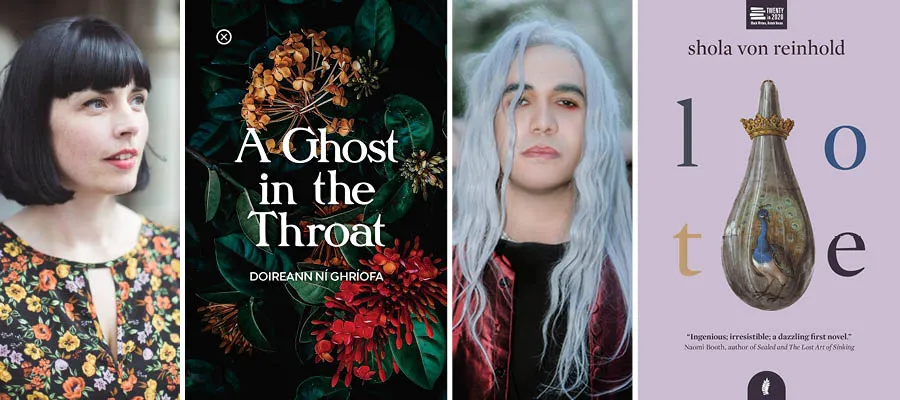Debut prose writers Doireann Ní Ghríofa and Shola von Reinhold join the stellar list of authors whose dazzling books have won the James Tait Black Prizes, awarded annually by the University of Edinburgh.

Book Festival
The winners of the £10,000 prizes were announced by author and broadcaster Sally Magnusson at a pre-recorded event at the Edinburgh International Book Festival - taking place in its new home at the University’s Edinburgh College of Art.
Doireann Ní Ghríofa’s winning book in the biography prize, A Ghost in the Throat, combines memoir with a mesmerizing exploration of the life of 18th-century poet, Eibhlín Dubh Ní Chonaill.
Acclaimed writer
Award-winning poet and essayist Doireann Ní Ghríofa has published several acclaimed works of poetry in both Irish and English, including Clasp, Oighear, and Lies. The winning biography, A Ghost in the Throat, published by Tramp Press, is the writer’s prose debut.
Biography Judge Dr Simon Cooke, of the University of Edinburgh, called The Ghost in the Throat “a work of great and searching depth and generosity, as involving as it is luminous, that weaves poetry, memoir, biography and translation into a powerful celebration of female texts and a profound exploration of the way the voice and life of one poet echoes in the life and voice of another.”
It's such a deep joy to be awarded this prize. In truth, I can barely believe it. From the very beginning, as I set out in pursuit of a ghost, this book often surprised me, and it continues to do so! I'm very grateful to the judges, to my agent Alba Ziegler-Bailey, and to the wonderful Tramp Press.
Doireann Ní Ghríofa
Biography winner
Shola von Reinhold’s winning book in the fiction prize, Lote, follows the narrator Mathilda's fixation with the forgotten Black Scottish modernist poet, Hermia Druitt – a bohemian socialite of the 1920s.
Shola von Reinhold is a writer based in Glasgow. Lote, their first novel, was published last year by Jacaranda as part of the publisher’s Twenty in 2020 scheme – a pioneering initiative to launch 20 titles by 20 Black British writers in one year.
Fiction Judge Dr Benjamin Bateman, of the University of Edinburgh, called Lote “an imaginative tour de force that combines a gripping detective plot with a thoughtful meditation on the historical neglect of Black queer and women artists.”
Not to be too dramatique, but my head is still spinning too much to make any kind of concise statement. Right now, I can't stop thinking of Hermia Druitt, who was alive a century ago when this prize was conceived, encountering many of the modernist winners and shortlistees but herself a Black, Afro-Scottish writer, unlikely to have been shortlisted for any such thing - so there's a strange joint sense of poetic mourning and justice for her and what she represents in the book. I am of course also delighted, and deeply thankful to the student and faculty judges for choosing it.
Shola von Reinhold
Fiction winner
The James Tait Black Prizes are for the best works of fiction and biography during the previous 12 months. They are the only major British book awards judged by literature scholars and students. Prizes are awarded by the University of Edinburgh’s English Literature department, which is the oldest in the world.
Doireann Ní Ghríofa’s book was chosen from a biography shortlist that featured The Warrior, the Voyager, and the Artist: Three Lives in an Age of Empire (Yale) by Kate Fullagar; Black Spartacus: The Epic Life of Toussaint Louverture (Allen Lane) by Sudhir Hazareesingh; and Recollections of My Non-Existence (Granta) by Rebecca Solnit.
Shola von Reinhold’s book topped a fiction shortlist featuring three other writers, including: Alligator & Other Stories (Picador) By Dima Alzayat; The First Woman (Oneworld) by Jennifer Nansubuga Makumbi; and A Children’s Bible (W.W. Norton) by Lydia Millet.
Each of these extraordinary books is superlative in its own irreducibly distinctive ways, and each speaks powerfully to the others. For all the artificiality of the contest that comes with prizes, I hope we honour such inspiring writers by putting their work in one another’s company.
Dr Simon Cooke
Biography Judge
Every year it is tremendously difficult to select a winner, and this year our decision was made even harder by the diverse themes and creative strengths of these four standout works of fiction.
Dr Benjamin Bateman
Fiction Judge
The James Tait Black Prizes are distinctive in the way that they are judged. Each year two academic judges rely on the help of postgraduate student readers to critically assess the shortlisted works.
The James Tait Black Prizes began celebrating books more than a century ago after Janet Tait Black née Coats – part of the renowned threadmaking family J & P Coats – made provision in her will for the creation of two book prizes to be awarded annually in memory of her husband, James Tait Black.
Since 2017 the University has also run a free online course in partnership with Edinburgh International Book Festival to offer readers the chance to engage with judges and other readers on the shortlisted fiction books.
The Massive Open Online Course (MOOC) – called ‘How to Read a Novel’ – draws on the James Tait Black fiction shortlist and to date has attracted more than 52,000 participants from across the globe.
Related links
Watch the award ceremony at Edinburgh International Book Festival

